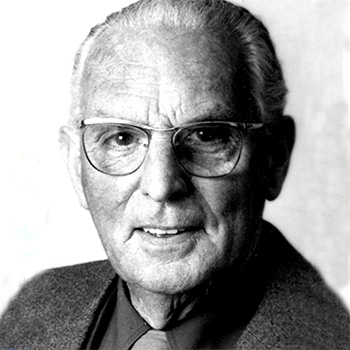Back to series


Maturity Can Be Measured
Click here to open a Print - Friendly PDF
The biblical writers frequently draw parallels between physical and spiritual life, and in many cases the parallels are close. The physical maturity of a child can be measured with the aid of a tape measure and scales; the child’s intellectual development can be gauged by examinations and tests. Likewise our own growth in maturity can be measured, and those most closely associated with us will be the best judges of our growth. Paul states the infallible standard of measurement— “the whole measure of the fullness of Christ.”
This seems a daunting and unattainable standard; but then, could an infinitely holy and ethically perfect God entertain a standard any lower? Dr. A. T. Robertson, the eminent Greek scholar, throws light on this dilemma. In commenting on our Lord’s staggering demand, “Be perfect therefore as your heavenly Father is perfect” (Matt. 5:48), he explains the significance of the word “perfect” in this context: “Here it is the goal set before us, the absolute standard of our heavenly Father. The word is also used for relative perfection, as of adults compared with children” (italics mine).1
 We will know absolute maturity only when we see Christ and are like Him (see 1 John 3:2), but until then it is possible to attain a relative maturity, “continually progressing to maturity,”—the perfection of a child going on to maturity. Both aspects coalesce in Philippians 3:12-15, where Paul says,
We will know absolute maturity only when we see Christ and are like Him (see 1 John 3:2), but until then it is possible to attain a relative maturity, “continually progressing to maturity,”—the perfection of a child going on to maturity. Both aspects coalesce in Philippians 3:12-15, where Paul says,
Not that I have already obtained all this, or have already been made perfect, but I press on to take hold of that for which Christ Jesus took hold of me. Brothers, I do not consider myself yet to have taken hold of it, But one thing I do: Forgetting what is behind and straining toward what is ahead, I press on toward the goal to win the prize for which God has called me heavenward in Christ Jesus. All of us who are mature should take such a view of things.
Paul here clearly disclaims having attained an absolute maturity, but he lays claim to a relative maturity in his experience.
How May We Gauge Our Degree of Maturity?
Paul rules out the validity of comparing ourselves with ourselves. “We do not dare to classify or compare ourselves with some who commend themselves. When they measure themselves by themselves and compare themselves with themselves, they are not wise” (2 Cor. 10:12).
In his book Christian Holiness Bishop Stephen Neill concurs with Paul’s dictum. Bishop Neill writes, “Is man once again to be the measure of all things? By what standard am I to be judged? Is my unaided capacity at any one moment to be the measure at that moment of Christian attainment and Christian expectation?”2
The answer is, No! The measure of our maturity is seen when the “fullness of Christ”—the sum total of all the qualities that make Him what He is—is increasingly exhibited in our lives.
The primary mark of a developing maturity is growth in personal and experiential knowledge of God, coupled with a strong aspiration to know Him better. This was well illustrated in the experience of Moses. As his intimacy with God developed, he had the temerity to ask of Him, “If I have found favor in your eyes, teach me your ways so I may know you…” (Exod. 33:13). The readiness of the Lord’s response should encourage others to make the same request. “And the Lord said to Moses, ‘I will do the very thing you have asked…’” (Exod. 33:17a).
This gracious response gave Moses boldness to ask for yet a further blessing. Wonderful as it was to have an understanding of God’s ways—the principles on which he governs His people—that only inflamed Moses’ desire to know God himself in a more intimate way. So Moses asked, “Now show me your glory” (Exod. 33:18). This request, too, was granted. Every forward move toward a deeper knowledge of God was met by a positive response.
 Paul cherished a similar aspiration. “I want to know Christ, and the power of his resurrection, and the fellowship of sharing in His sufferings, becoming like him in his death” (Phil. 3:10). Only a maturing Christian would share that aspiration. It was not a mere intellectual concept of Christ that Paul desired, but a comprehension, an acquaintance with Him on the deepest level that would issue in transformation and unreserved commitment.
Paul cherished a similar aspiration. “I want to know Christ, and the power of his resurrection, and the fellowship of sharing in His sufferings, becoming like him in his death” (Phil. 3:10). Only a maturing Christian would share that aspiration. It was not a mere intellectual concept of Christ that Paul desired, but a comprehension, an acquaintance with Him on the deepest level that would issue in transformation and unreserved commitment.
The maturing Christian has as a life objective the securing of the glory of God. The old Presbyterian catechism has its priorities right with its first question, “What is the chief end of man?” Equally right is its answer, “The chief end of man is to glorify God and enjoy Him for ever.”
The first petition of Christ’s pattern prayer, “Hallowed be your name,” is really asking that God’s name might be honored and glorified everywhere, by all people. If we prayed this petition sincerely, we could well add, “at any cost to me.” Every choice in which the honor and glory of God is involved will have only one answer from the mature Christian. There is no room for debate.
After Jesus had opened His heart to His intimates in the Upper Room, he offered His moving High Priestly Prayer. The prayer sounds as if He is reporting to His Father about His earthly ministry: “I have brought you glory on earth by completing the work you gave me to do” (John 17:4). How concise yet how comprehensive! Since the servant is not greater than his or her Lord, the maturing Christian will experience a growing passion for the glory of God such as gripped Count Nikolaus von Zinzendorf, founder of the Moravian Church—“I have one passion; it is He, He alone!”
To the mature Christian holiness will be more attractive than mere happiness. It seems that in some Christian circles, the pursuit of happiness has become almost pathological. In a recent letter from Dr. J. Hudson Taylor III, he makes the following assessment of the contemporary scene: “Ours is a very self-centered culture. Self-fulfillment and self-advancement have become our chief goals. Even Christians are not exempt from this. The leading question of our faith seems to be, ‘How can I be happy and satisfied?’ As a result there is shallow conversion and superficial commitment.” The mature Christian has learned that true happiness is a by-product of holiness.
A consuming desire to be holy is clearer proof of sanctification than is an itch for thrilling and exciting experiences. John Wesley once said he doubted that people had been made complete in Christ while they came to church to enjoy religion, instead of to learn how to be holy.
God wants His people to be joyous, and the Holy Spirit is the source of that fruit of the Spirit, which is joy. Jesus said, “These things have I spoken unto you, that my joy might remain in you, and that your joy might be full” (John 15:11 KJV). But true happiness comes only along the pathway of holiness.
Our Lord was the most joyous person this world has ever known, and this was because He was the holiest. It was said of Him, “You have loved righteousness and hated wickedness; therefore God, your God, has set you above your companions by anointing you with the oil of joy” (Heb. 1:9, italics mine).
When we make holiness the object of our pursuit, joy is thrown in as a bonus. It takes some of us a long time, however, to master the elementary lesson that we are happiest when we are holiest.
The maturing Christian becomes dissatisfied with the “milk” of the Word and craves “solid food.” “You need milk,” wrote the author of the letter to the Hebrews, “not solid food. Anyone who lives on milk, being still an infant, is not acquainted with the teaching of righteousness. But solid food is for the mature…” (Heb 5:13a-14, italics mine).
No longer is the maturing Christian solely dependent on pre-digested spiritual food and artificial stimuli. The spiritual infant has now learned how to nurture the inner life on the Word of God and delves more deeply into its teachings. While enjoying helpful and challenging Christian literature, the main stimulus comes directly from the Word of God illuminated by the Holy Spirit.
The maturing Christian also has a growing discernment that helps him to discriminate between truth and error, good and evil. “The mature…by constant use have trained themselves to distinguish good from evil” (Heb. 5:14). There is such a thing as spiritual intuition, but more than that is in view here. It is a spiritual sensitivity that comes from “training”—that is, through the mastery of the principles of Scripture and their consistent application to the decisions and events of daily life.
This quality characterized the Christians at Berea. When new teaching was presented to them, they did not accept it on the mere say-so of those who brought it, but they searched the Scriptures daily to see if these things were really so. They trained their spiritual senses to detect error just as police dogs are trained to detect harmful drugs. The Bereans were not heresy hunters but truth seekers. This type of Christian does not fall an easy prey to the heresies and cults that abound today.
Like the Master, the maturing Christian prefers serving others to being served by others. The maturing Christian emulates the Lord who claimed, “I am among you as one who serves” (Luke 22:27c). “For even the Son of Man did not come to be served, but to serve” (Mark 10:45).
True spiritual leadership springs not from a desire to rule but from a passion to serve. This exotic grace is not native to most of us, but the Master equated it with greatness. “Whoever wants to be great among you must be your servant” (Mark 10:43).
This was one of the most revolutionary concepts Jesus introduced into the religious world of His day. Now, as then, most want to be masters not servants, leaders not followers. Christ’s view of His kingdom was a community of people characterized by serving one another and the needy world outside. Unlike in earthly realms, our status in His kingdom is to be judged by the number of people whom we serve, not by the number who serve us.
It was in the context of servanthood that Jesus said, “I have set you an example that you should do as I have done for you. I tell you the truth, no servant is greater than his master, nor is a messenger greater than the one who sent him” (John 13:15-16).
The life of the maturing Christian will be characterized by giving rather than receiving. In this the Master is again the model. “The Son of Man [came]...to give his life as a ransom for many” (Mark 10:45). This, too, is not natural to us. In the Christian life we are mostly on the receiving end, but Jesus exemplified our responsibility to give as well as to receive.
From Bethlehem to Calvary, the Lord’s life was one consistent giving of Himself, a constant outpouring of His life, until at its close, He gave up life itself. Every act of service He performed cost Him something. When an afflicted woman pressed her way through the throng and touched the fringe of His robe, she was healed. But in the process He lost something—nervous and spiritual force. “I know that power has gone out from me,” Jesus said (Luke 8:46). He gladly gave of Himself to needy people in life, even as He gave His life for needy people in death.
It is far easier for us to give time or money than it is to give our very selves to those in need around us, yet this is the path to spiritual fruitfulness. The mature Christian life will be fruitful, not barren. The ability to reproduce oneself is the proof of physical maturity, and this is also true of spiritual maturity. One of Christ’s purposes for us as His disciples is that our lives should be fruitful. “You did not choose me, but I chose you to go and bear fruit—fruit that will last [. . . This is my command]” (John 15:16). A fruitless disciple is a contradiction in terms.
What constitutes “fruit”? We can look for it in two areas. There will be fruit in character—the fruit of the Spirit that finds expression in the nine winsome graces enumerated in Galatians 5:22-23. Note that these are passive rather than active qualities. All nine can be produced in the life of one who is paralyzed from the neck down. As we grow in maturity, these graces will be manifested in increasing measure.
There will be fruit in service. “Even now the reaper...harvests the crop for eternal life, so that the sower and the reaper may be glad together” (John 4:36). In writing to the Romans, Paul revealed the purpose of his visit: “I planned many times to come to you ...in order that I might have a harvest among you” (Rom. 1:13). Souls won and lives discipled and encouraged into a closer walk with God will be evidence of a believer’s growing maturity.
The maturing Christian’s life will be dynamic rather than static. The growing believer will not resist change that is obviously in the interests of the church of God. The maturing Christian will reach out toward new horizons of service and will grapple with new concepts of truth. The growing believer will not be content with reading what is superficial but will welcome mind Growth will continue even in old age.
The maturing believer will accept rather than resent or rebel against the disciplines God in His wisdom allows to come into his or her life. If we are maturing as Christians, we may not actually enjoy the experience while we are passing through it—and Scripture realistically recognizes this possibility (see Heb. 12:11)—but we will regard the will of God as being “good, acceptable, and perfect” (Rom. 12:2 KJV), a statement that indicates that God’s will for our lives cannot be improved upon.
As Paul’s character matured, he was able to testify that he had reached the place where he could truthfully say, “I have learned to be content whatever the circumstances” (Phil. 4:11). Not that he had always been content, but his increasingly intimate walk with God had made him absolutely satisfied that whatever God ordained was in his best interests.
When tragedy, sorrow, or bereavement strike, it is not always easy to hold on to this contentment, but it is the only path to comfort and peace of heart. Paul enunciated a principle of perpetual relevance when he recorded the word from the Lord that came to him: “He said to me, ‘My grace is sufficient for you, for my power is made perfect in weakness’ “(2 Cor. 12:9).
He will glory in the Cross of Christ and will sing with Sir John Bowring:
In the cross of Christ I glory,
Towering o’er the wrecks of time,
All the light of sacred story
Gathers round its head sublime.
 Only the spiritual person welcomes the impact of the Cross on his or her life, for it spells death to the self-life. “I have been crucified with Christ, and I no longer live, but Christ lives in me” (Gal. 2:20a).
Only the spiritual person welcomes the impact of the Cross on his or her life, for it spells death to the self-life. “I have been crucified with Christ, and I no longer live, but Christ lives in me” (Gal. 2:20a).
The mature Christian will be willing to accept responsibility in the work of the kingdom. Not everyone is called to a place of prominence in God’s service, but very many could do much more than they are doing if only they would respond to the promptings of the Spirit and the persuasion of godly people. All too many believers are content to be spectators instead of participators.
The immature Christian is content to accept all the blessings and benefits of faith but is unwilling to share the accompanying responsibilities. When God called Moses to lead Israel out of Egypt, he produced all kinds of excuses to cover up his unwillingness to assume that onerous responsibility. We can all understand and perhaps condone Moses’ reluctance, but God did not. He was angry at Moses’ lack of confidence that He would enable him to do what He had commanded (see Exod. 4:14). God is equally displeased with us when we decline responsibility and cover it up with a plea of inadequacy.
The mature believer will be willing to accept responsibility for failure, too, and will not shuffle the blame onto a subordinate.
The mature Christian will demonstrate a growing love for God and others. Paul commended the Thessalonian believers for this mark of their growing maturity: “We ought always to thank God for you, brothers, and rightly so, because your faith is growing more and more, and the love every one of you has for each other is increasing” (2 Thess. 1:3).
By pouring out his love into our hearts by the Holy Spirit (Rom. 5:5), God stimulates and enlarges our hearts and enables us to love Him in return. Love begets love. But when love cools, every grace languishes.
Growth in maturity is stimulated by sharing the knowledge of God with other believers, for we are to become mature in community life as well as in individual experience.
Paul talks of attaining “the unity of faith” as well as spiritual maturity, for that develops best not in isolation but in the corporate life of the church (see Eph. 4:13). This unity among believers is produced by their mutual sharing of “the knowledge of the Son of God”—an increasing acquaintance with Him in corporate life. F. F. Bruce rightly contends that “the higher reaches of the Christian life cannot be attained in isolation from others.”3 It is the team that is fully integrated and works together unselfishly and harmoniously that wins the game.
Notes
1 A.T. Robertson, Word Pictures in the New Testament I (New York: R.R. Smith, Inc., 1930), p. 49.
2 Stephen Neill, Christian Holiness (New York: Harper & Row Publishers, 1960), p. 38.
3 Frederick F. Bruce, Epistle to the Ephesians (Old Tappan, New Jersey: Fleming H. Revell Co., 1961), p. 86.

J. Oswald Sanders
Author J. Oswald Sanders (1902 - 1992) attended the Bible Training Institute in Auckland and joined its staff in 1926. Sanders served as an instructor and administrator at the Bible College of New Zealand. He became general director of the China Inland Mission and led the reorganization of the CIM into the Overseas Missionary Fellowship. He was instrumental in beginning many new missions projects throughout East Asia. Upon his retirement Sanders wrote prolifically, with many of his over 40 books. One of Sander's most notable works was Heresies Ancient and Modern, later published as Cults and Isms (1962). COPYRIGHT: This publication is published by C.S. Lewis Institute; 8001 Braddock Road, Suite 301; Springfield, VA 22151. Portions of the publication may be reproduced for noncommercial, local church or ministry use without prior permission. Electronic copies of the PDF files may be duplicated and transmitted via e-mail for personal and church use. Articles may not be modified without prior written permission of the Institute. For questions, contact the Institute: 703.914.5602 or email us.
COPYRIGHT: This publication is published by C.S. Lewis Institute; 8001 Braddock Road, Suite 301; Springfield, VA 22151. Portions of the publication may be reproduced for noncommercial, local church or ministry use without prior permission. Electronic copies of the PDF files may be duplicated and transmitted via e-mail for personal and church use. Articles may not be modified without prior written permission of the Institute. For questions, contact the Institute: 703.914.5602 or email us.
-
Recent Podcasts
Ralph Waldo Emerson’s Philosophy and Influence
by David George Moore on July 26, 2024Ralph Waldo Emerson was a gifted nineteenth century...Read More
-
The Side B Stories – Nate Sala’s Story
by Jana Harmon, Nate Sala on July 19, 2024
-
Terrorism Through the Eyes of Faith
by Dennis Hollinger on July 12, 2024
-
Recent Publications
Hasn’t Science Proven That Belief in God Is an Outdated Superstition?
by Sharon Dirckx on July 1, 2024Many assume that scientific practice and belief in...Read More
-
Has the Bible Been Corrupted as Some Muslims Claim?
by Andy Bannister on June 1, 2024
-
Seeing Jesus Through the Eyes of Women
by Rebecca McLaughlin on May 15, 2024
0
All Booked
0.00
All Booked
0.00
All Booked
22194
C.S. Lewis’s The Abolition of Man Live Online Small Group 8:00 PM ET
https://www.cslewisinstitute.org/?event=c-s-lewiss-the-abolition-of-man-study-course&event_date=2024-10-02®=1
https://www.paypal.com/cgi-bin/webscr
2024-10-02

Next coming event
Days
Hours
Minutes
Seconds
C.S. Lewis’s The Abolition of Man Live Online Small Group 8:00 PM ET
On October 2, 2024 at 8:00 pmSpeakers

J. Oswald Sanders
Author
Team Members






